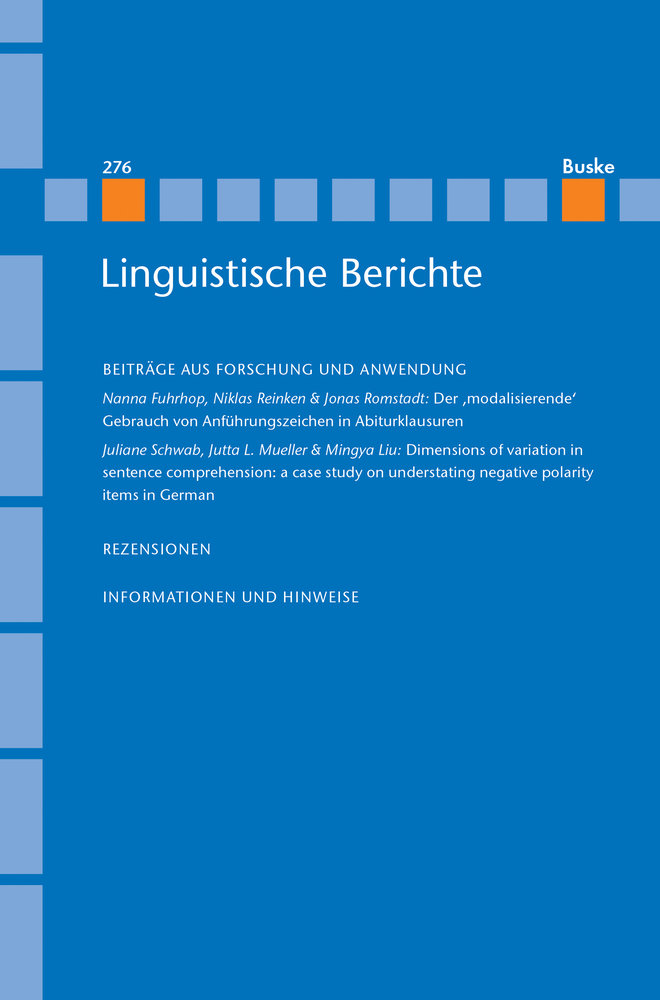Beiträge aus Forschung und Anwendung- Nanna Fuhrhop, Niklas Reinken & Jonas Romstadt: Der 'modalisierende' Gebrauch von Anführungszeichen in AbiturklausurenAbstract: Quotation marks are substantially used for direct speech and citations. For the 'modalizing' use, the Official Rules state that a "different understanding than usual" is indicated; they give very little information on the use of quotation marks beyond literal reference. It therefore seems all the more interesting to investigate the usage of modalizing quotation marks. In the present analysis, we studied the school-leaving examinations of an entire year. School-leaving examinations are texts by persons whose institutional acquisition of written language can be regarded as complete; they are texts written by skilled writers. The investigation takes into account both formal and functional observations. We recognized differences between school subjects that can be interpreted with regard to the concept of educational language. The writers described here showed a high sensitivity (conscious or unconscious) to the use of quotation marks, which we call the "struggle for educational language". This may be related to the corpus investigated here. However, our study constitutes a solid basis for further corpus studies on quotation marks.- Juliane Schwab, Jutta L. Mueller & Mingya Liu: Dimensions of variation in sentence comprehension: a case study on understating negative polarity items in GermanAbstract: Despite the rich theoretical and empirical literature on negative polarity items (NPIs) in general, understating NPIs like all that or much have received relatively little attention in psycholinguistics. In this paper, we investigate the comprehension, processing, and production of two such understating NPIs in German, namely 'sonderlich' ('particularly') and 'so recht' ('really'). In a first experiment, using self-paced reading and naturalness ratings, we found that 'sonderlich', contrary to 'so recht', was rated as natural in affirmative contexts although this environment is incompatible with NPIs. The finding is subsequently extended to the domain of sentence production, demonstrating that 'so recht' was consistently used as NPI, but 'sonderlich' was not. The last two experiments investigate the factors underlying this finding, showing that the surprising patterns for 'sonderlich' may relate to its susceptibility for interference from form- and meaning-related lexical competitors during tasks that strain cognitive resources, and, to some extent, to individual differences in participants' language aptitude measured through print exposure. Based on the novel empirical data, we discuss the theoretical status of 'sonderlich' and 'so recht' as understating NPIs, on the one hand, and the cognitive mechanisms affecting retrieval of their NPI-related lexical-semantic features, on the other.Rezensionen- Sophie Ellsäßer: Magali Paquot & Stefan Th. Gries (Hgg.) (2020): A practical handbook of corpus linguistics- Okan Kubus: Gary Morgan (ed.) (2020): Understanding deafness, language and development- Horst M. Müller: Michael A. Arbib (Hg.) (2020): How the brain got language -towards a new road mapInformationen und Hinweisevon Klaus Müllner und den Herausgeber*innen



